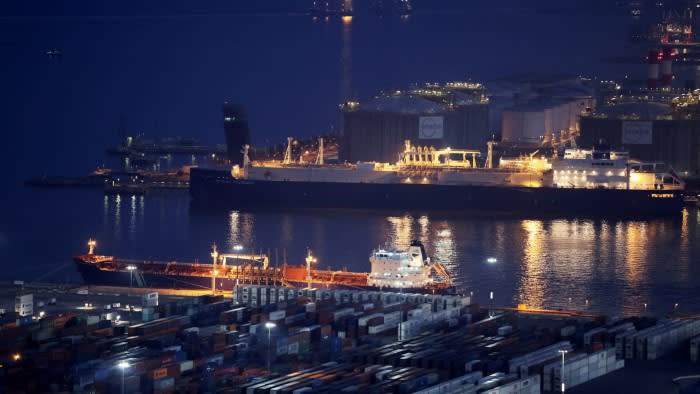
Stay informed with free updates
Simply sign up to the EU energy myFT Digest — delivered directly to your inbox.
The EU’s energy regulator has warned the bloc still needs to import Russian liquefied natural gas to avoid an energy shock, even as a group of member states seeks to ban purchases of the fuel from Moscow.
Acer, the bloc’s energy watchdog, on Friday said efforts to curb Europe’s record imports of Russian LNG “should be approached with caution” because the supply of pipeline gas from the country is set to fall at the end of the year.
“The reduction of Russian LNG imports should be considered in gradual steps,” Acer said in a report that highlighted the difficulty for the EU of balancing energy security with the drive to hit Russia’s finances by cutting gas purchases.
The watchdog, which closely monitors Europe’s energy market for adverse developments, plays a lead role in co-ordinating national regulatory bodies.
Although the EU has succeeded in replacing Russian pipeline gas with LNG since the Kremlin’s 2022 full-scale invasion of Ukraine, the global gas market is still tight.
Energy markets have been volatile this year, amid concern about a possible escalation in Israel’s war with Hamas and confrontation with Iran, although to date increases in oil and gas prices have been relatively contained.
In large part, the EU has cushioned its shift away from Russian pipeline gas by increasing its purchases of LNG from the country as well as from other suppliers.
Russia is now the bloc’s second-biggest LNG supplier after the US, accounting for 16 per cent of total imports last year. The 15.5mn tonnes of Russian LNG bought by EU nations last year was nearly 40 per cent more than the total in 2021, according to Kpler, a data provider.
EU diplomats say countries including Sweden, Finland and the Baltic states are pushing for the EU to impose an immediate total ban on Russian LNG, a step that would require unanimity by member states. Member state officials are set to lobby the European Commission over the plan next week.
“It’s a particularly important issue for countries around the Baltic Sea,” said one diplomat involved in the negotiations.
But the fuel is imported by countries such as France, Spain and Belgium, and some of it is sold on to Germany and its central European neighbours, which are concerned about keeping down energy costs for industry.
The EU watchdog also signalled its concern about individual member states using new powers “to temporarily restrict gas supplies, including LNG, from Russia and Belarus”, noting such moves could hit long-term supply contracts agreed with Moscow before the 2022 Ukraine invasion.
Breaking such contracts could force European companies to pay hefty penalties.
The new powers were backed by the European parliament last week but still require final approval by member states.
The regulator highlighted that the end of pipeline shipments from Russia via Ukraine to the EU this year would reduce the bloc’s gas supplies by 13.6bn cubic metres, or about 4 per cent of last year’s total consumption.
The expiration of the transit contract will end flows through one of only two remaining pipeline routes from Russia to Europe; the other goes under the Black Sea to Turkey and Bulgaria.
Overall, European gas imports from Russia have fallen about two-thirds from pre-invasion levels, even as supply has shifted from pipelines to LNG.

EU officials have been urging European companies to avoid buying Russian LNG now that gas storage levels are at record levels and prices have come down from the post-invasion peak.
The bloc has banned Russian oil and coal imports and the commission has proposed ending all fossil fuel imports from Russia by 2027.
Highlighting the difficulty of ending all Russian LNG imports by that date, the watchdog noted shifting supplies was more complicated where there are so-called destination clauses that limit selling on gas to another buyer.
In such instances, it said, “it would request more time for negotiations to reach an agreement but having 2027 in the horizon”.
In a further sign of potential intra-EU tensions on energy security, Austria, Hungary, Czech Republic and Slovakia have warned that a German levy on transporting gas from the country could force them to increase Russian imports.
The commission said “unilateral national measures in the form of export restrictions, or levies at cross-border exit points put energy solidarity at risk”. It declined to comment on whether it would open legal proceedings against Germany, which Austria had requested.

